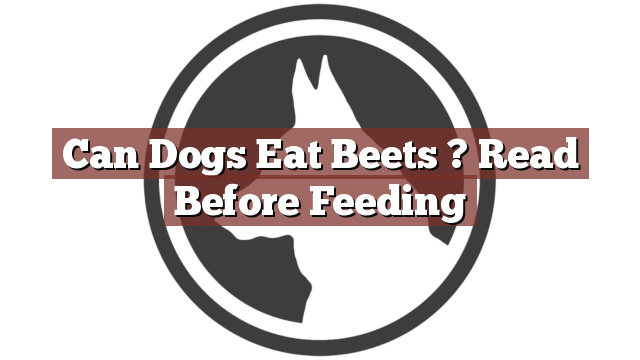Understanding Your Dog’s Dietary Needs
When it comes to our furry friends, understanding their dietary needs is crucial for their overall health and well-being. While dogs primarily thrive on a diet rich in protein, it’s important to consider incorporating other nutritious foods into their meals for a balanced diet. However, not all human foods are safe for dogs, and it’s essential to educate ourselves before introducing new foods into their diet. One common question that arises is, "Can dogs eat beets?"
Can Dogs Eat Beets? Read Before Feeding
The answer to the question "Can dogs eat beets?" is yes. Beets are safe for dogs to consume and can even offer numerous health benefits. Beets are low in calories and high in fiber, making them an excellent addition to your dog’s diet. The fiber content can aid in digestion and promote a healthy gastrointestinal system. Additionally, beets are a great source of essential nutrients such as folate, manganese, and potassium, which can benefit your dog’s overall health.
However, it’s important to note that beets should be fed to dogs in moderation. Feeding too many beets can lead to gastrointestinal upset, including diarrhea or stomach discomfort. It’s always best to introduce new foods gradually and monitor your dog’s reaction. If you notice any adverse effects, such as vomiting or changes in stool consistency, it’s advisable to cease feeding beets and consult your veterinarian.
Pros and Cons of Feeding Beets to Dogs
Feeding beets to your dog has its pros and cons. On the positive side, beets are a nutrient-dense vegetable that can provide various health benefits. The high fiber content can aid in regulating bowel movements and prevent constipation. Beets are also rich in antioxidants, which can help boost your dog’s immune system and combat oxidative stress. Additionally, the natural sweetness of beets can be appealing to dogs, making it an enjoyable treat for them.
However, it’s important to consider the cons as well. Beets contain a naturally occurring compound called oxalates, which can lead to the formation of kidney stones in some dogs. Therefore, if your dog has a history of urinary issues or bladder stones, it’s advisable to avoid feeding them beets. Furthermore, beets can cause a temporary change in urine color, turning it reddish or pinkish. While this is harmless, it’s always a good idea to consult your veterinarian if you notice any unusual changes in your dog’s urine.
Conclusion: Is it Safe to Feed Beets to Your Dog?
In conclusion, dogs can eat beets in moderation, and it can be a healthy addition to their diet. Beets provide essential nutrients, promote good digestion, and offer various health benefits. However, it’s crucial to introduce beets gradually and monitor your dog’s reaction. Always feed beets in moderation and consult your veterinarian if you have any concerns or notice any adverse effects. By understanding your dog’s dietary needs and making informed choices, you can ensure their health and well-being.
Thank you for taking the time to read through our exploration of [page_title]. As every dog lover knows, our furry friends have unique dietary needs and responses, often varying from one canine to another. This is why it's paramount to approach any changes in their diet with caution and knowledge.
Before introducing any new treats or making alterations to your dog's diet based on our insights, it's crucial to consult with a veterinarian about [page_title]. Their expertise ensures that the choices you make are well-suited to your particular pet's health and well-being.
Even seemingly harmless foods can sometimes lead to allergic reactions or digestive issues, which is why monitoring your dog after introducing any new food item is essential.
The content provided here on [page_title] is crafted with care, thorough research, and a genuine love for dogs. Nevertheless, it serves as a general guideline and should not be considered a substitute for professional veterinary advice.
Always prioritize the expert insights of your veterinarian, and remember that the health and happiness of your furry companion come first.
May your journey with your pet continue to be filled with joy, love, and safe culinary adventures. Happy reading, and even happier snacking for your canine friend!

